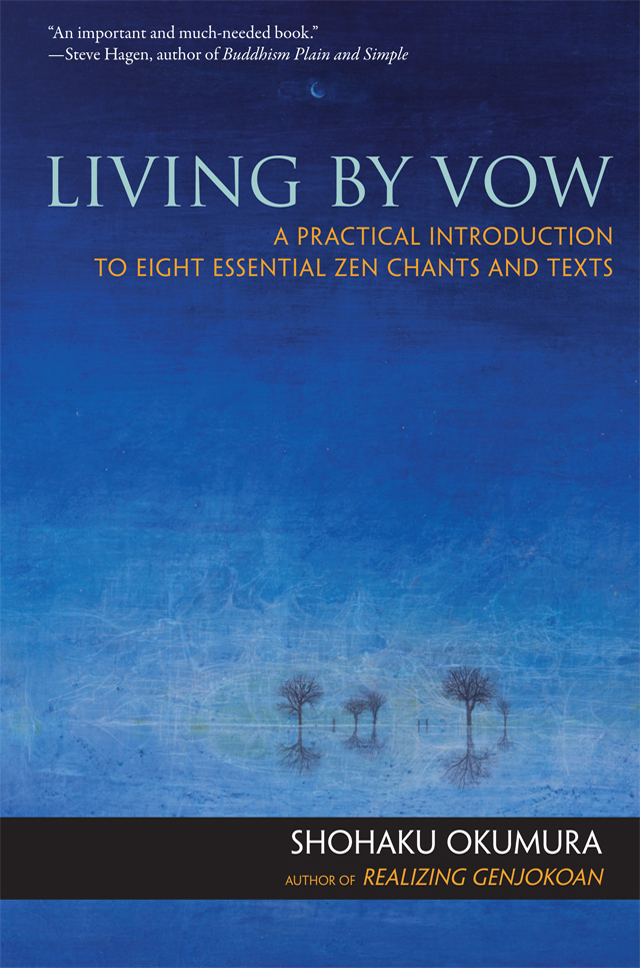Dear All,
We will begin reflections on Shohaku Okumura Roshi's LIVING BY VOW: A Practical Introduction to Eight Essential Zen Chants and Texts ...
This week, we look at the Author's Preface and the Introduction only.
Of course, you can discuss anything about the book in this thread (or stay silent). Please ask a question if there is something unclear, and I will do my best to find an answer. Here, I just suggest a few possible topics and observations:
Okumura Roshi, like many of us, is walking the fine line between preserving and keeping relevant certain traditions and practices, while also recognizing the conclusion of scholars on the realities of Buddhist history, the viewpoints of modern science and the like. Please note, for example, the number of times he will allude to the fact that scholars may doubt whether a particular mythical event actually happened, whether words once believed to be those of the historical Buddha were actually created much later, whether a certain legendary figure actually lived or is primarily a fiction. While usually repeating and not challenging such viewpoints by the scholars, Okumura will nonethless find some continued relevance in the old legends, myths etc.
Do you believe that the attitude of the Bodhisattva is vital to Zen Practice, and must be focused on helping others before (or together with) ourself? Do you feel like a Bodhisattva yourself according to the definitions given?
The Introduction briefly introduces all the many Chants that Okumura will be looking at more closely later in the book, and seeks to make the point that "Vow" is at the center of all of them. Do you get that?
What do you think about his comment, "Such a reflection and realization of one's own incompleteness is repentance" ?
Toward the end of the Introduction, there is a long passage from Master Dogen's Shobogenzo-Gyoji about "continuous practice" (which is also known as "Practice-Enlightenment"). Is his meaning clear to you, and any impressions?
Anyway, this is just the Introduction, and we will get into the heart of the book next time.
Gassho, J
SatToday
We will begin reflections on Shohaku Okumura Roshi's LIVING BY VOW: A Practical Introduction to Eight Essential Zen Chants and Texts ...
This week, we look at the Author's Preface and the Introduction only.
Of course, you can discuss anything about the book in this thread (or stay silent). Please ask a question if there is something unclear, and I will do my best to find an answer. Here, I just suggest a few possible topics and observations:
Okumura Roshi, like many of us, is walking the fine line between preserving and keeping relevant certain traditions and practices, while also recognizing the conclusion of scholars on the realities of Buddhist history, the viewpoints of modern science and the like. Please note, for example, the number of times he will allude to the fact that scholars may doubt whether a particular mythical event actually happened, whether words once believed to be those of the historical Buddha were actually created much later, whether a certain legendary figure actually lived or is primarily a fiction. While usually repeating and not challenging such viewpoints by the scholars, Okumura will nonethless find some continued relevance in the old legends, myths etc.
Do you believe that the attitude of the Bodhisattva is vital to Zen Practice, and must be focused on helping others before (or together with) ourself? Do you feel like a Bodhisattva yourself according to the definitions given?
The Introduction briefly introduces all the many Chants that Okumura will be looking at more closely later in the book, and seeks to make the point that "Vow" is at the center of all of them. Do you get that?
What do you think about his comment, "Such a reflection and realization of one's own incompleteness is repentance" ?
Toward the end of the Introduction, there is a long passage from Master Dogen's Shobogenzo-Gyoji about "continuous practice" (which is also known as "Practice-Enlightenment"). Is his meaning clear to you, and any impressions?
Anyway, this is just the Introduction, and we will get into the heart of the book next time.
Gassho, J
SatToday


 ) In any case, all supports and raises all, and it all balances out!
) In any case, all supports and raises all, and it all balances out! 


Comment